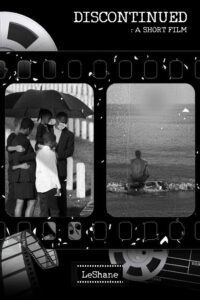
An interview with Author, Kevyn LeShane….
Why did you get into writing books?
From as early as I could remember I had the goal of becoming a storyteller before I die. I didn’t know exactly what format I would pursue first and I didn’t have much direction. I wanted to, and I still want to write books, screenwrite, and direct a movie one day but back then I didn’t really have a set sense of direction. I thought that becoming an author or publishing a book was a monumental feat in itself and ironically I thought it would be something that I would do once I reached my 50’s and had become established in my career field and accomplished other life goals that I thought I would achieve naturally first like getting married and having kids.
Writing books came about from a natural progression. I would probably say the catalyst was writing poetry for my girlfriend at the time when I was 16. After we broke up I continued writing poetry and I shifted my muse from her to the topics and concepts that crossed my mind. From there I started writing chapbooks and eventually full length anthologies. I continue to write because I want to have a conversation. Every book I write starts with a concept or a topic I want to add something to and contribute to the discourse about. I also try to write in a way that encourages my readers to think, form their own opinions, and continue the conversation forward.
What advice can you give young authors?
Great writing is a myth. 99% of the time you’re not going to translate from your imagination into words when you sit down to write it down the first time. Even if you do, I would challenge you to revisit it and see if there’s anything you would change about it to improve it. There’s only great editing. Because as writers we can always take a step back, reread our work and find things we can tweak to make what we wrote better. I think setting the expectation that I will continue to improve towards my end goal of writing something great has helped me avoid writer’s block, procrastinating and anxiety about the quality of my work.
This advice is also two-fold. Yes, you can always improve with time but you should also be aware once you’ve stagnated on a poem or page and just say it’s finished. If not, you’ll never publish anything. Don’t let your inner critic stop you from achieving your goals. Write, edit, review, edit, review, publish and be satisfied with what you wrote.

What is your book about and what inspired you to write it?
My book is centered around a protagonist’s journey through the grieving process and was really inspired by all the unfortunate events of the present.
On a personal level I was experiencing strong feelings of despair, frustration and sadness when I began to write this book. I graduated with my Bachelor’s in May of 2020 during a recession, I had lost my job and a family friend because of COVID, and everyone in my life was experiencing hardships as a direct result of the virus.
On a broader level I was extremely discontented with the current state of affairs in the world both domestically and internationally. The prevalence of police brutality, racism, misogyny, & ethnocentric ideologies in the United States tears me apart inside. I don’t see how anyone can watch someone get choked to death by someone whose responsibility is to ensure public safety and not find an issue with it. I can’t fathom how someone can be blind to how someone’s racial, gender, and sexual identities play a role in how much they are compensated at work to their likelihood to be victims of violence and abuse. These factors impact our lives and that’s just reality. I grew more frustrated as COVID 19 continued to spread, the lack of political leadership, and how people showed a lack of accountability for the safety of others as many people continued to disregard safety protocols, regulations, and recommendations from healthcare organizations and officials despite the growing number of casualties and hospitalizations.
All of the frustration drove me to write about what was going on. The overarching theme that was showing itself through most of my writing around the time was a sense of pain and grief. At least in American society, we don’t talk enough about dealing with hardship and grief and it’s so counterintuitive. We are exposed to positive and cheery emotions all the time in the media but in comparison we are seldom exposed to a more realistic depiction of life and the full spectrum of emotional experiences. Everyone in life will go through trying times, experience the death of a loved one, experience some form of trauma, etc. These things are all a part of the human experience and it is crucial that we learn how to navigate them. I wanted to write a real story about overcoming grief in a relatable way. There’s material that shows what it may look like to process the events that have happened, the destructive coping mechanisms someone might engage in, uncovering the underlying emotions, constructive ways to cope, positive thinking and more. I just really wanted to frame a fictional narrative that people could relate to and could maybe help someone dealing with hardships overcome them. Powerful stories can really have that kind of impact on people.
Link where your book can be purchased.
It’s available on Amazon through this link – Click here

